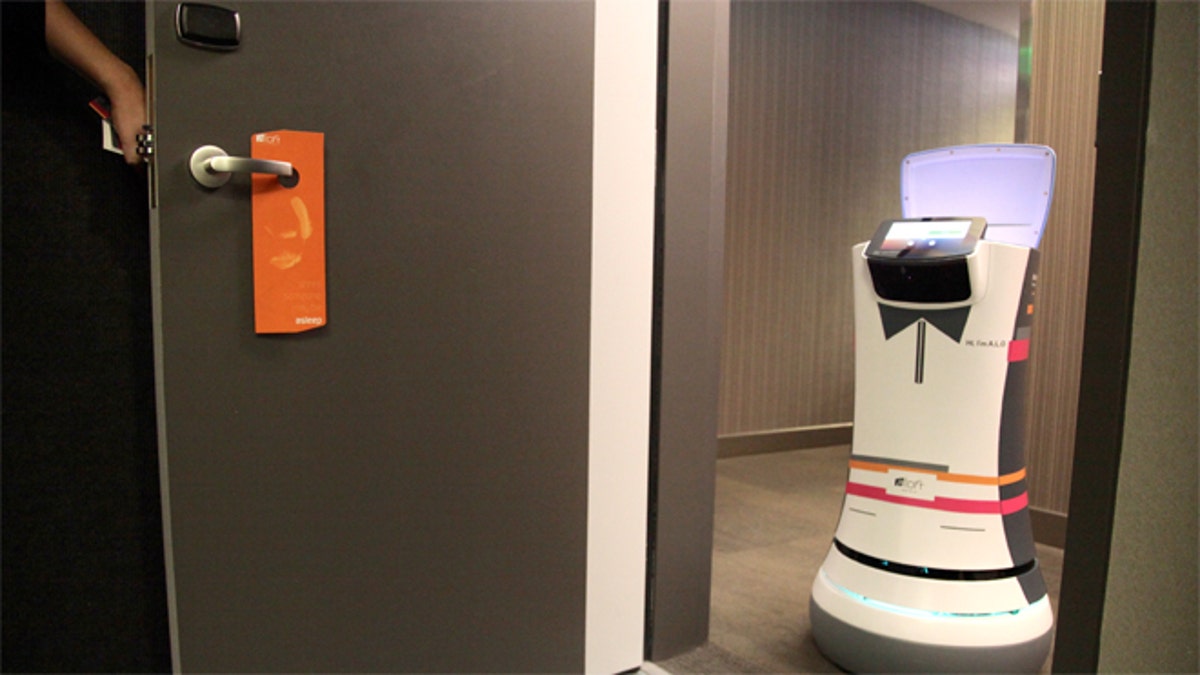
Robtics company Savioke see huge potential in bots that service hotel guests. (Savioke)
Last month, hospitality giant Starwood introduced the world to its 3-foot-tall robotic employee: the Botler, which it tested in one of its mid-priced Aloft hotels in Silicon Valley.
The story made global headlines – and why not?
[pullquote]
The white robot looks like R2-D2 from Star Wars, complete with a bow tie. And perhaps better than a real butler, it makes a dance-like spin when a human praises it for delivering a forgotten toothbrush or extra towel.
Savioke, the company that makes the robot, is basing its future on the premise that robots will spread across the hotel world. So far, Starwood is using one robot. But if this year’s pilot goes well, it could buy 100 more.
"We see the multibillion-dollar hospitality industry as the ideal place to debut our SaviOne robot,” says Steve Cousins, CEO of Savioke, which counts Google as an investor. “Being able to delight guests while freeing up front desk personnel to focus more on customer service is a great recipe for success."
But whether the traveling public is ready to interact with a thing instead of a human isn’t clear.
On the pro-robot side: From a sheer entertainment point of view, these robots provide a futuristic feel and performance that are worth sharing, especially on social media. They also save money – for hotel owners, who can use them 24/7 without paying them overtime or providing health care benefits, and for guests, since robots don’t have a hand to hold out for a tip.
The anti-robot argument revolves primarily around how they’re not people. They can’t offer empathy and recognition to travelers, who are often tired from their journeys when they need help or realize they’ve forgotten something.
“How will robots create an atmosphere of a great hospitality experience?” asks Marco Nussbaum, CEO of prizeotel, a stylish budget hotel chain in Germany that embraces automation for functions that once required people. “It’s the people that make the difference. Always has been and always will be.”
The much-larger multinational company Hilton Worldwide, which has its name on more than 4,200 hotels across the globe and runs brands including Hilton, Doubletree and Waldorf Astoria, likewise embraces technology, yet shuns robots. By the end of this year, Hilton-brand customers will be able to check into their rooms digitally and select their exact rooms with their smartphones.
No robot needed. And it looks like no robot in their future, either.
“Hilton does not have plans to implement robots at our properties in the near future,” said Geraldine Calpin, Hilton Worldwide’s digital chief.
Yet the decreasing cost of making robots is making them more attractive to hotels and others in the travel industry, says robotics engineer Kevin Dowling, co-founder of 4moms, a robotics company that designs products for children.
“While service robots have been a topic for decades, they are now finally viable, due in part of the decreasing cost of electronics, actuation and sensing, the key parts of robotics systems,” Dowling says.
But even Dowling knows there are pros and cons. Because robots don’t require much human involvement, he said, no one may know when there’s a problem.
That’s why veteran luxury hotelier Laurence Geller believes robots are here to stay, but in a limited form. Geller is no stranger to technology; when he was CEO of the luxury hotel ownership company Strategic Hotels, he helped craft the renovation of the InterCon Miami, which featured a 19-story “digital canvas” screen splashed on its prominent tower.
Guests have been embracing services that require no human contact for years, Geller said, noting that automatic checkout has become routine.
“You can use robotic instruments for mundane tasks such as housekeeping, vacuum cleaning,” he said. “It’s nothing new. We’ve been going that way since we’ve had pool cleaners.”
But while it’s fun to think of droids mixing our high-priced cocktails or serving our candlelit dinners, Geller believes robots will take their place in a less sexy space.
“It will be super wonderful until the first robot blows up. I hardly see it for high-end service,” he said.
